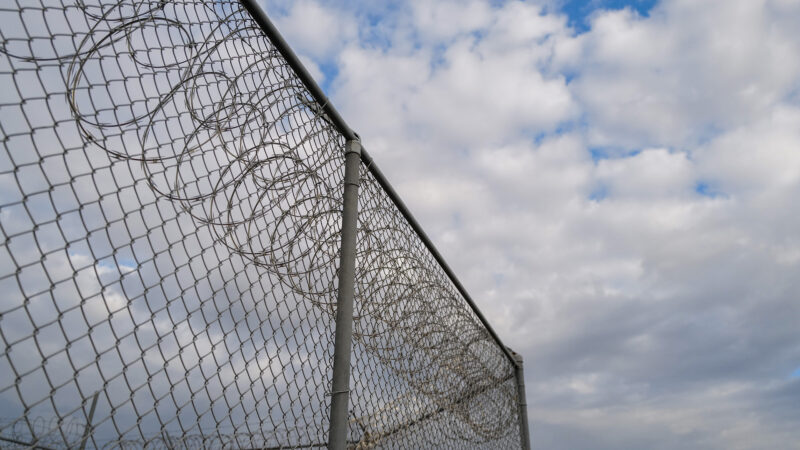Spurred by slow deportation wait times, Louisiana ICE detainees attempted a hunger strike
In this file photo, barbed wire surrounds the South Louisiana ICE Processing Center in Basile, Louisiana. The facility is operated by Geo Group, a publicly traded corporation that invests in private prisons. Roughly 300 detainees at another Geo Group facility in Jena, Louisiana attempted to stage a hunger strike in late February.
Roughly 300 detainees in a Louisiana Immigration and Customs Enforcement detention center in Jena attempted to stage a hunger strike recently, according to a press release from Detention Watch Network.
The group refused breakfast on Feb. 27, demanding that grievances over deportation wait times be addressed.
A detainee, who is going by the alias Julio for fear of retaliation for speaking out, said people are being deported a month and a half to three months after they receive their final deportation notices.
“We don’t want people to stay that amount of time,” Julio said. “That’s why we’re doing the hunger strike.”
But after only two days, the attempted strike ended. Spokespeople from ICE and from GEO Group — the company that operates the facility — refute that a hunger strike took place at the detention center. Both groups in separate emails cited ICE’s Performance Based National Detention Standards, which classify a hunger strike as detainees refusing meals for 72 hours or nine consecutive meals.
ICE did not directly address the question of long waits for deportation but sent information about how complex the process can be.
“Enforcement and Removal Operations is focused on smart, effective immigration enforcement that protects the homeland through the arrest and removal of those who undermine the safety of our communities and the integrity of our immigration laws,” an Ice spokesperson said in an email.
Julio said detainees’ cases have constantly been held up in immigration courts, with many having their court appointments canceled or rescheduled. He does not think that practice is fair.
“We’re locked up and we want to see results,” he said. “So sometimes we raise our voices and talk [and] try to get attention.”
Julio said the hunger strike attempt was also organized due to detainees not receiving adequate personal hygiene items — specifically, shampoo, toilet paper, toothbrushes and toothpaste — sometimes waiting for hours for toiletries that they need to get clean for the day and not having bags for trash on the weekends.
“People get up early at 7 a.m. and they don’t bring things till 2 or 3 p.m. On weekends, [we] don’t have anything,” Julio said. “We have to push them to bring us what we need.”
He also said that there are leaks in the building’s structure that let rainwater drip onto detainees’ beds.
In an email, a GEO Group representative said the detention center “provides regular distribution of hygiene products to residents twice a week and provides refills on an “as needed” basis as required by ICE’s Performance Based National Detention Standards. The spokesperson also rejected that the detention center is not maintained well and said once the facility learned of the leaky roof they initiated and completed a work order to fix it.
Julio said facility staff has said they would provide hygiene products more frequently. He and other detainees are waiting to see if that happens before organizing a future strike attempt.
Louisiana immigrant detention facilities have seen several hunger strikes from detainees in recent years, including one at the Central Louisiana ICE Processing Center in 2019, in which five detainees were force-hydrated after refusing to eat for two months. In 2020, mass hunger strikes at Pine Prairie ICE Processing Center and Winn Correctional Center were reportedly quashed with the use of pepper spray and alleged excessive force.
This story was produced by the Gulf States Newsroom, a collaboration among Mississippi Public Broadcasting, WBHM in Alabama and WWNO and WRKF in Louisiana and NPR.
DOJ says no evidence Jeffrey Epstein had a ‘client list’ or blackmailed associates
The two-page memo outlines the "exhaustive review" the department conducted of the Epstein files in its possession, and also reiterates that Epstein died by suicide, contrary to some conspiracy theories.
Floods are getting more dangerous around the country, not just in Texas
The deadly floods in Central Texas were caused by extremely heavy rain. Climate change is causing even more rain to fall during the heaviest storms.
Near old Montana mine, special clinic for asbestos-related illness fights to survive
The Center for Asbestos Related Disease in Libby, Montana, closed in May after a court judgment. The clinic's federal funding is also threatened. Patients with scarred lungs worry about what's next.
4 things to know about the deadly Texas floods and ongoing search efforts
Search efforts continue for the dozens of people still missing after Friday's floods, as questions swirl over what went wrong. Here's what we know so far.
In Peru, criminal gangs are targeting schools in poor neighborhoods for extortion
The president of one of Lima's largest parent-teacher associations says at least 1,000 schools in the Peruvian capital are being extorted and that most are caving into the demands of the gangs.
The hidden cost of oil: Families fractured by a pipeline project
As the 900-mile East African Crude Oil Pipeline project takes shape in Uganda, there is the promise of economic benefit. But it's shaking up the lives of some 100,000 people.







